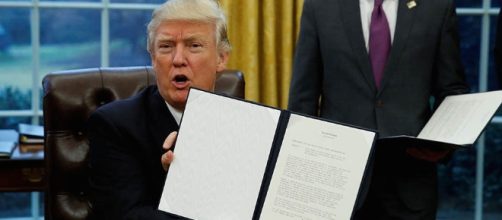At the end of his first week in Office, President #Donald Trump on Friday signed an executive order setting bans and eventual “extreme” vetting of Moslem refugees from “at risk” countries, as well as giving priority to Christian and other minority groups persecuted in these countries. The announced decision made headlines around the world as it goes against long American tradition of accepting migrants from religious persecution and will also cause major problems for the international agencies processing the millions of migrants fleeing the hot spots in the Middle East.
New executive order
This decision was not a surprise as it had been foreshadowed days before at the signing of another executive order on Immigration. The actions against Moslem immigration had been a major part of Donald Trump’s presidential campaign and even then had raised concerns about the implications, particularly on a constitutional level.
While the actions will surely please many who voted for him, these same measures will also cause embarrassment and distress to the moderate elements of the Republican Party. The reaction against the decisions included an impassioned appeal by Noble Peace Prize winner #Malala Yousafzai who is living proof that the Islamic extremists not only target other religions, but also Moslems who oppose their very limited interpretations of the Koran.
The United States of America was founded by refugees fleeing religious persecution in Europe and so Freedom of religion is a proud and important part of the Constitution. Although the incident of the so-called “Ship of shame” in 1939 was a blot on this record, no American President before Donald Trump had ever targeted a specific religious group for particular attention. This decision was also emphasized by the President’s admission to the Christian Broadcast Network that he will also give priority to Christian refugees.
In fact, for this very reason the executive order will certainly be subject to appeals to the Supreme Court on the basis of its unconstitutionality. Worse still for the President, the Republican Party, already subject to a rumours, whispering and leaks campaign against the new President, will be forced to publicly confront and address this most delicate of issues.
Victims twice over
Sadly these new measures will mean that the millions of Moslem refugees fleeing their homes are now victims twice over. The fanatic groups such as the Taliban and ISIS target have less patience for “heretical” Moslems than they do for other persecuted minorities in the territories they control and now the refugees who were victims of the Islamic terrorists are now also victims of a climate mistrust that these terrorists have been hoping to provoke in the Western world towards their religion.
The first week of the Trump Administration has seen a number of executive orders signed that seem to indicate a rush to achieve the more controversial aspects of the political agenda that gave him victory on November 8th last.
One of these has already caused a public clash with Mexico in response to the order to build a wall between the two countries and to the cancellation by President Enrique Peña Nieto of his planned visit to the United States. This after the Woman’s March on Saturday last which attracted a huge crowd to protest Donald Trump’s attitude to women and to defend women’s rights.
The decision to block and then severely limit Moslem immigration will only provide more opposition to the new President and may even force into action those politicians within his own Party such as House Leader Paul Ryan, John McCain and Marco Rubio who have publicly expressed their doubts on Donald Trump.
In any case, given the nature of the orders, the final decision will probably not come from the Senate or Congress, but from the Supreme Court who are the final arbiters of American Laws.

